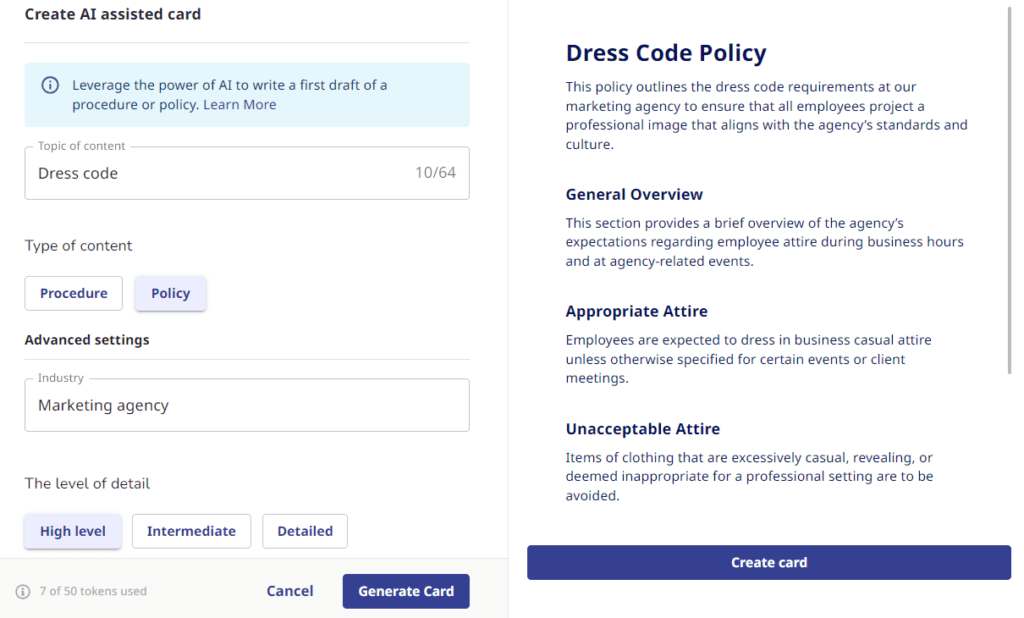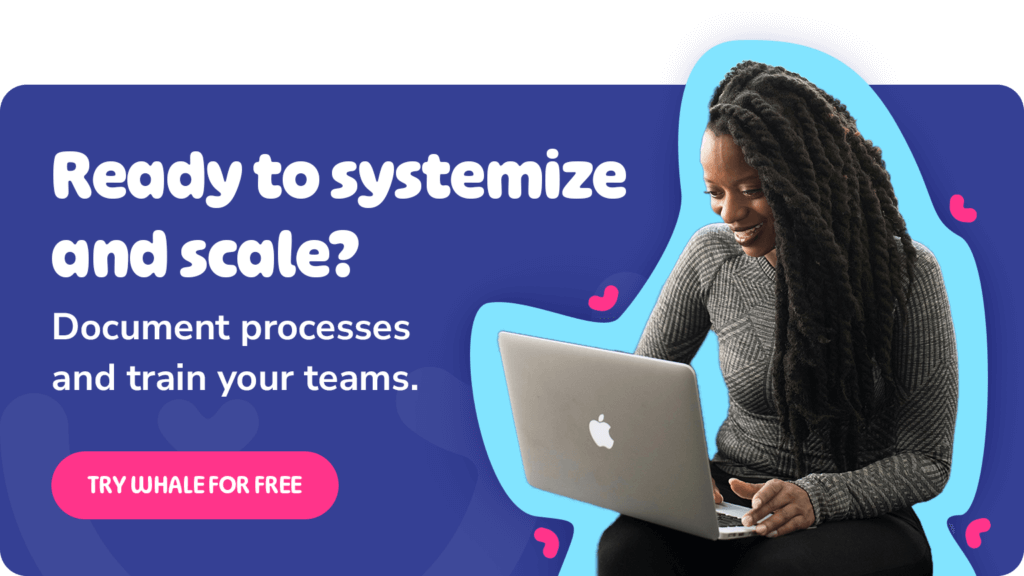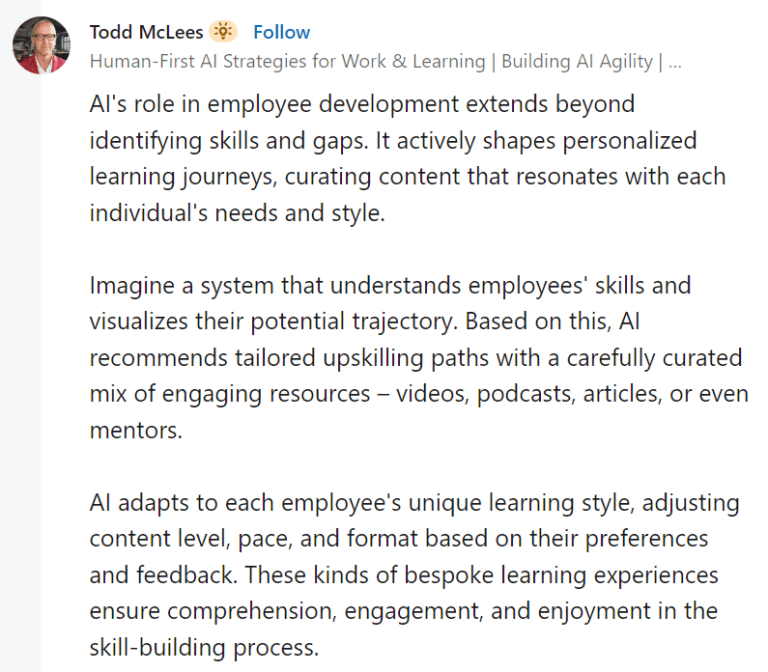Over the past year, AI has experienced exponential growth, and you can’t turn a corner without hearing about it.
But does that also apply to employee training? How is it currently being used in the industry? What about the future?
We heard your questions, and the wait is over!
In this blog, we’ll dive into the role of AI in employee training and how you can benefit from using it.
The role of AI in employee training
In his article, a global HR leader, Josh Bersin, said, “After a year of experimentation, it’s now clear that AI will revolutionize this space.” Let’s look at a few ways it’s doing that below.
1. Create training content
We can all agree that creating training material from scratch is a time-consuming yet necessary process.
But what if you could complete this task without taking up much of your time?
Using AI in your employee training process can create content based on the information you provide.
For example, features like Whale’s AI assist can create training material for your new hires to help them submit quarterly reports. Tell it what kind of content you want, what industry it’s for, and how detailed you want it.

With this foundation, you can quickly adjust the content AI made for you instead of creating everything from scratch.
2. Provide 24/7 support
Ever wished you could be in multiple places, completing various tasks at once? As lovely as that sounds, unfortunately, your time and availability are limited. This can be an issue when training your remote and in-person staff.
That’s where conversational AI would come in handy. It’ll act as the 24/7 support system for your employees as they go through your training program.
For example, let’s say your remote new hire is reviewing their onboarding material after working hours and needs help. Since you’re unavailable, they can’t ask you questions. However, a conversational AI chatbot can answer their questions based on your data, their intent, and the previous questions and context they provided.
But how’s that different from a traditional chatbot? 🤔
Traditional chatbots are trained to answer specific questions, mainly FAQs. On the other hand, conversational AI chatbots work like human conversations. And when used for your employee training programs, this can feel like a mentor your employees have access to around the clock!
3. Create testing material
Have you ever spoken to someone and forgotten most of what they said after the conversation? It’s not just you. According to The Forgetting Curve, developed by Hermann Ebbinghaus, we rapidly forget most information a few hours and days after learning it.
So, despite your employees’ best efforts to remember everything they learned during the training program, they’ll likely forget something. To help them, AI can create quizzes using your material to test their knowledge.
For example, with Whale’s AI quiz feature, you can test your employees’ knowledge on specific policies like your dress code or employee handbook. You can decide how many questions your quiz will have, how many multiple-choice answers you want for each question and its difficulty level.

4. Identify skill gaps
Not all your employees, even those in similar roles, have the same skill sets. For example, let’s say you have two sales reps. One is skilled in negotiations, while the other has industry and product knowledge.
There’s no doubt that you can find this information without AI. However, with AI, you can see each employee’s proficiency level with their skills and skills they don’t have. With this insight, you can see your team’s skill gaps and where they need more training.
As a bonus, you’ll build a culture of continuous learning, which can encourage employees to stick around. And according to LinkedIn’s 2023 Workplace Report, three out of five reasons employees leave are due to a lack of learning and growth opportunities.
So, if retaining top talent is on your priority list, AI’s role in helping with this is worth keeping in mind!
5. Personalized, adaptive training programs
Raise your hand if you know how difficult it is to have a training program that benefits everyone taking it. ✋ The truth is that most employee training programs are for the majority. So you’ll always have someone who finds it too advanced and another who thinks it’s not challenging enough. And not only skill levels but everyone learns differently — different pace, styles, etc.
But, creating programs that work for everyone is sometimes time-consuming and borderline impossible.
Luckily, with AI, you can create programs that adapt to your employees. It’ll identify their needs, style, existing knowledge, and more to build a personalized program. And if it determines that an employee needs more time in one area, it can adjust the program to fit their needs.
6. Analyze training data and make predictions
Every company likely has endless data they collected from their training sessions. But finding time to organize, sort through, and then make sense of it is difficult. Not to mention if you want to make predictions. 😬
That’s why one of the top use cases of AI in employee training is to analyze your data. It can quickly organize it, explain what’s happening, and predict what training program you should make next.
Benefits of AI in employee training
Now that you know AI’s role in your employee training process, what are some benefits you can expect? Let’s look at a few of them.
Increased employee engagement
Most training programs are long and difficult to consume. However, since you can create personalized programs using AI, your employees are more likely to be engaged with the material. According to Gallup, employees who feel more engaged are more likely to stay, are more productive, and can increase profitability by up to 21%.
Who doesn’t like benefits like that?
Inclusivity
Every company says they’re inclusive, but unfortunately, most training programs are one-size-fits-all. This can cause some employees to feel left out when their learning patterns and pace don’t fit the majority. Some employers can adjust for one or two employees. But when there are more than that? Making those changes so everyone gets the most from your program can feel impossible.
When you use AI for employee training, you can create personalized programs that make everyone feel included.
Increased productivity
Your employees aren’t the only ones who can benefit from incorporating AI in your training process. It can also help boost your productivity levels. For example, you won’t have to spend so much time on admin tasks. This can free you up to focus on strategizing and interacting with employees one-on-one.
Bottom line?
"A generation ago, the half-life of the value of a skill was approximately 26 years.
Now the half-life is often less than five years. So, it is perhaps not surprising that, globally, corporations are expected to invest more than $380 billion in learning and development programs this year." (Harvard Business Review)
Not only is AI spurring the increased investment in learning but it’s also proving to be part of the solution.
Of course, there are some challenges that AI can pose in employee training, like over-relying on its capabilities. However, with parameters in place to allow AI to assist you instead of replacing your role, you can benefit from its different uses.
Want to see how AI can help you with your employee training process? Sign up to Whale for free today.





